MercoPress. South Atlantic News Agency
Tag: South Georgia
-
Tuesday, January 27th 2026 - 15:20 UTC
Government of South Georgia are recruiting their next Chief Executive Officer

The Government of South Georgia and South Sandwich Islands, GSGSSI, are recruiting for their next Chief Executive Officer – to be based in Government House, Stanley, Falkland Islands.
-
Monday, January 19th 2026 - 12:59 UTC
South Georgia, Discovery Investigations: 100 Years Of Marine Science Stamp Release
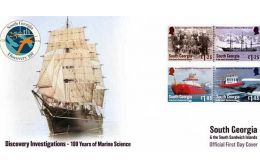
Two-hundred and fifty years ago Captain James Cook landed at Possession Bay and took possession of South Georgia, in the name of King George III and his heirs.
-
Thursday, December 18th 2025 - 19:25 UTC
Falklands and South Georgia stand out in WOAH “Devastating Biodiversity Loss” report on HPAI
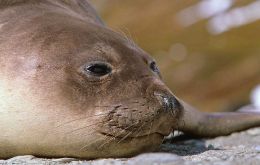
The World Organization for Animal Health (WOAH) has released a critical statement on the devastating impact of High Pathogenicity Avian Influenza (HPAI) on wildlife populations worldwide. The organization reports that the current panzootic is causing unprecedented ecological disruption and mortality rates across a rapidly expanding range of species.
-
Sunday, December 7th 2025 - 18:27 UTC
South Georgia’s changing ocean currents affect the rich marine ecosystem
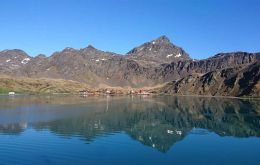
Scientists have uncovered how changing ocean currents in South Georgia's fjords could affect the survival of young mackerel icefish. The species is a key component of the island's rich marine ecosystem and is an important prey species for seals and penguins.
-
Tuesday, December 2nd 2025 - 18:46 UTC
South Georgia Heritage Trust unveils Memorial to 175.000 whales, … and their fantastic resurgence
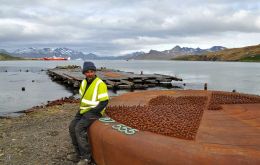
An artwork memorializing the impact of the whaling industry on marine life has been installed in South Georgia. The memorial by artist Michael Visocchiis, who was chosen through an international competition, is called Commensalis: The Spirit Tables of South Georgia. Once completed, the memorial will consist of seven circular tables made of weathered steel.
-
Monday, November 17th 2025 - 21:16 UTC
Avian flu decimates seal elephant population in South Georgia; few survivors emerge in Uruguayan beaches
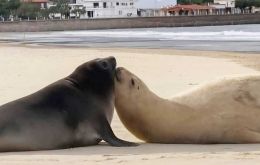
In the last few months there have been at least twenty incidents of elephant seals emerging along Uruguayan beaches, both females and males, and allegedly they belong to “deep South species”, according to local environmental and animal protection organizations such as “FaunaMarinaSOS”.
-
Monday, November 17th 2025 - 21:06 UTC
South Georgia stamps celebrate 250 years of British Crown possession

The Falkland Islands Postal and Philatelic Service on Thursday 13 November released a commemorative set of stamps celebrating when Captain James Cook 250 years ago, landed at Possession Bay and took possession of the South Georgia island in the name of King George.
-
Wednesday, October 8th 2025 - 21:33 UTC
South Georgia receives the visit of Commissioner Martin-Reynolds
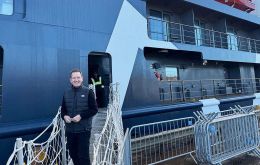
The Governor of the Falkland Islands and Commissioner of South Georgia and the South Sandwich Islands, Mr. Colin Martin-Reynolds has visited the British Overseas Territory, some 1.400 kilometers east/south east of the Falklands, and which are also in his realm of action.
-
Monday, October 6th 2025 - 08:39 UTC
South Georgia invitation to Tender for a UK flagged Fisheries Protection Vessel
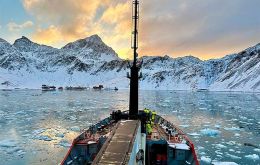
The Government of South Georgia and the South Sandwich Islands (GSGSSI) invites tenders for the Time Charter of a UK-flagged Patrol, Security and Fisheries Protection Vessel (FPV).
-
Tuesday, August 5th 2025 - 08:32 UTC
South Georgia, forty year old Antarctica iceberg breaking up and drifting north
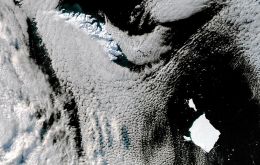
Almost four decades after breaking from Antarctica’s Filchner Ice Shelf, a still massive iceberg is showing its age. The berg, named A-23A, is shedding large chunks of ice as it drifts in the southern South Atlantic Ocean, about 2,400 kilometers north of its birthplace.
